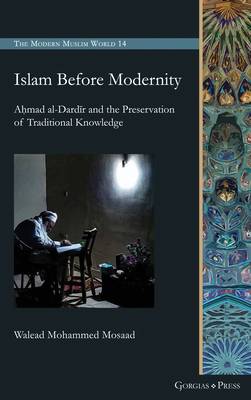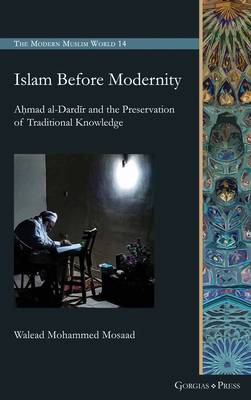
- Retrait gratuit dans votre magasin Club
- 7.000.000 titres dans notre catalogue
- Payer en toute sécurité
- Toujours un magasin près de chez vous
- Retrait gratuit dans votre magasin Club
- 7.000.0000 titres dans notre catalogue
- Payer en toute sécurité
- Toujours un magasin près de chez vous
Islam Before Modernity
Aḥmad al-Dardīr and the Preservation of Traditional Knowledge
Walead Mohammed MosaadDescription
This book examines the role of tradition and discursive knowledge transmission on the formation of the 'ulamā', the learned scholarly class in Islam, and their approach to the articulation of the Islamic disciplines. The basis of this examination is the twelfth/eighteenth century scholar, Aḥmad ibn Muḥammad al-Dardīr, an Egyptian Azharī who wrote highly influential treatises in the disciplines of creedal theology, Mālikī jurisprudence, and taṣawwuf (Sufism). He also occupied a prominent role in the urban life of Cairo, and is accredited with several incidents of intercession with the rulers on behalf of the Cairo populace. This book argues that a useful framework for evaluating the intellectual contributions of post-classical scholars such as al-Dardīr involves the concept of an Islamic discursive tradition, where al-Dardīr's specific contributions were aimed towards preserving, upholding, and maintaining the Islamic tradition, including the intellectual "sub-traditions" that came to define it.
Spécifications
Parties prenantes
- Auteur(s) :
- Editeur:
Contenu
- Nombre de pages :
- 372
- Langue:
- Anglais
- Collection :
- Tome:
- n° 14
Caractéristiques
- EAN:
- 9781463243807
- Date de parution :
- 30-06-22
- Format:
- Livre relié
- Format numérique:
- Genaaid
- Dimensions :
- 152 mm x 229 mm
- Poids :
- 666 g

Les avis
Nous publions uniquement les avis qui respectent les conditions requises. Consultez nos conditions pour les avis.






